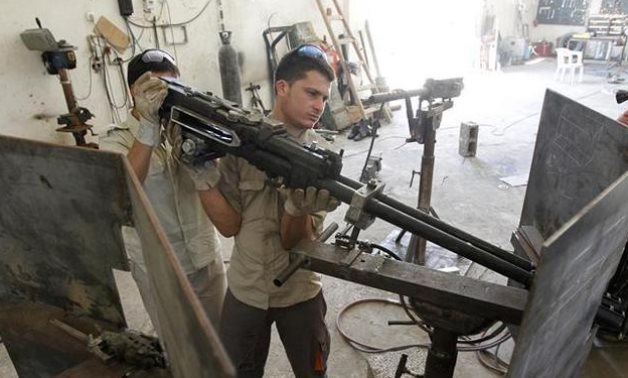
Libyan mechanic try to fit a weapon to a shield which will be used for a pick-up truck in a weapons workshop in Misrata July 10, 2011. REUTERS/Thaier al-Sudani
CAIRO -1 March 2020: Ankara continues to transfer arms and ammunition to cities in western Libya, as the head of the national interim government, Abdel Hamid Dabaiba, hands over the ministerial formation to the presidency of the House of Representatives.
The "Radar Flight" website, which tracks air traffic, revealed that the Turkish military flights included an Airbus A400M plane that took off from the Kayseri base in Konya, an Airbus A400M that took off from Ataturk base in Ankara, and a Lockheed C130E that took off from a military base near Antalya to Libya.
On Friday afternoon, two planes landed at Wattaya Air Base, which includes Turkish armed advisers, while the third landed at the Misurata Air College airport in the west of the country.
For his part, a professor of political science at Omar al-Mukhtar al-Libi University, Yusef al-Farsi, said that the presence of a Turkish air bridge to western Libyan cities impedes international political efforts that aim to address the crisis by peaceful means that most importantly include the formation of a national unity government that seeks to resolve problems and face the upcoming security, economic, electoral and constitutional challenges.
Farsi pointed to the Libyan people’s suffering from the ravages of war and conflicts by the terrorist groups funded by Turkey, stressing Turkey is trying to seize the wealth of Libya, which has the fifth-largest oil reserves in the world, while the parties of the Government of National Accord (GNA) is biased towards Turkish interventions.
Farsi explained that the Turkish side continues to violate international agreements, especially the Law of the Sea, emphasizing the need for Ankara to dissolve the armed militias inside Libya and integrate moderate elements into security and military institutions, and the need to expel the Syrian militias and mercenaries supported by Turkey.
Meanwhile, Libyan political analyst Ahmed Al-Mahdawi said that the Turkish air bridge hadn't stopped its flights to the west of the country since the ceasefire was announced in October 2020, noting that Ankara does not welcome the results of the 5 + 5 Libyan Joint Military Committee meetings, and that it continues to transfer mercenaries to Libya to ignite the war and thwart efforts to unify institutions.
The Libyan political analyst confirmed that the Brotherhood is exerting pressure on Dabaiba not to prejudice the memoranda of understanding signed between Al-Wefaq and Ankara, referring to the forceful Turkish presence in western Libya, putting the prime minister in fear of clashing with the Brotherhood and the Turks at this crucial stage in Libya's history.
In the same context, the Libyan Political Dialogue Forum affirmed that selecting the ministers of the recent government remain the inherent right of Prime Minister Abdel Hamid Dabaiba, with the right to consult with the Presidency Council regarding the selection of the defense and foreign ministers.
The members of the forum stressed in a statement on Friday that the road map does not oblige the prime minister to consult with members of the forum.
The forum further indicated its adherence to the road map for the preliminary stage and the specific dates contained therein, affirming the necessity to respect the stipulated elements in the formation of the government to take into account the efficiency, merit and fair representation, and to ensure the participation of all the society’s cultural components and the substantial representation of women and youth by at least 30 percent.
The Forum for Political Dialogue urged members of the Libyan parliament to “meet urgently to complete the required tasks in preparation for the following stage,” to fulfill the aspirations of the Libyan people and hold the general elections on December 24.
Comments
Leave a Comment